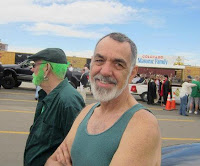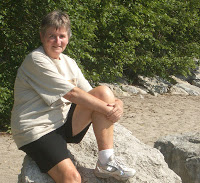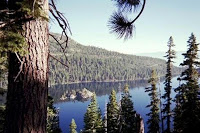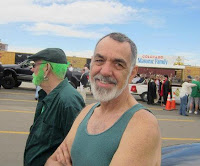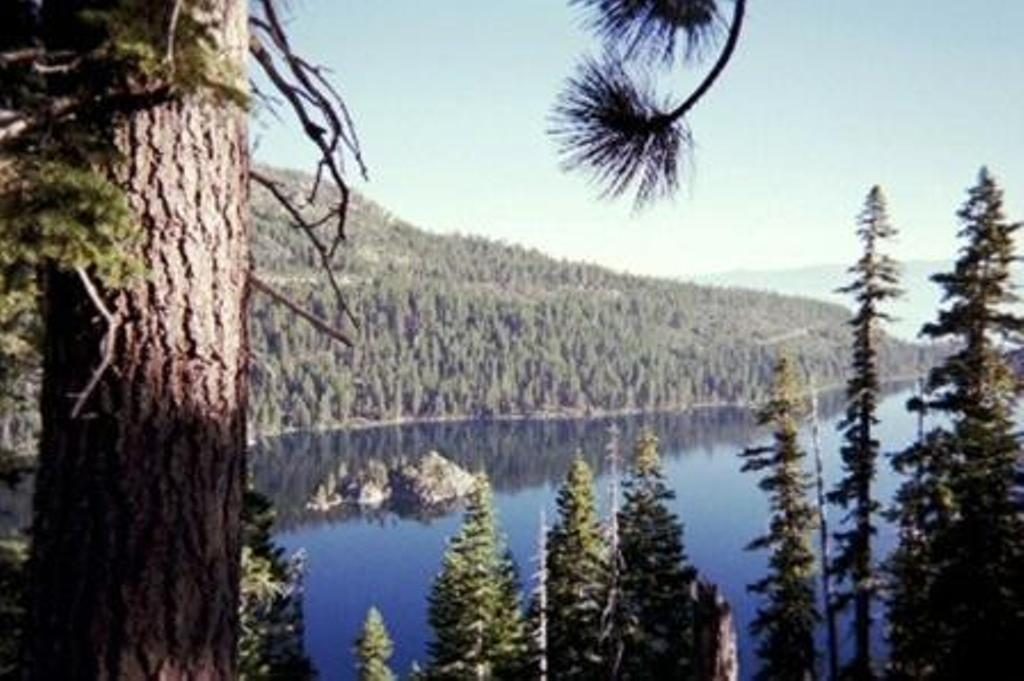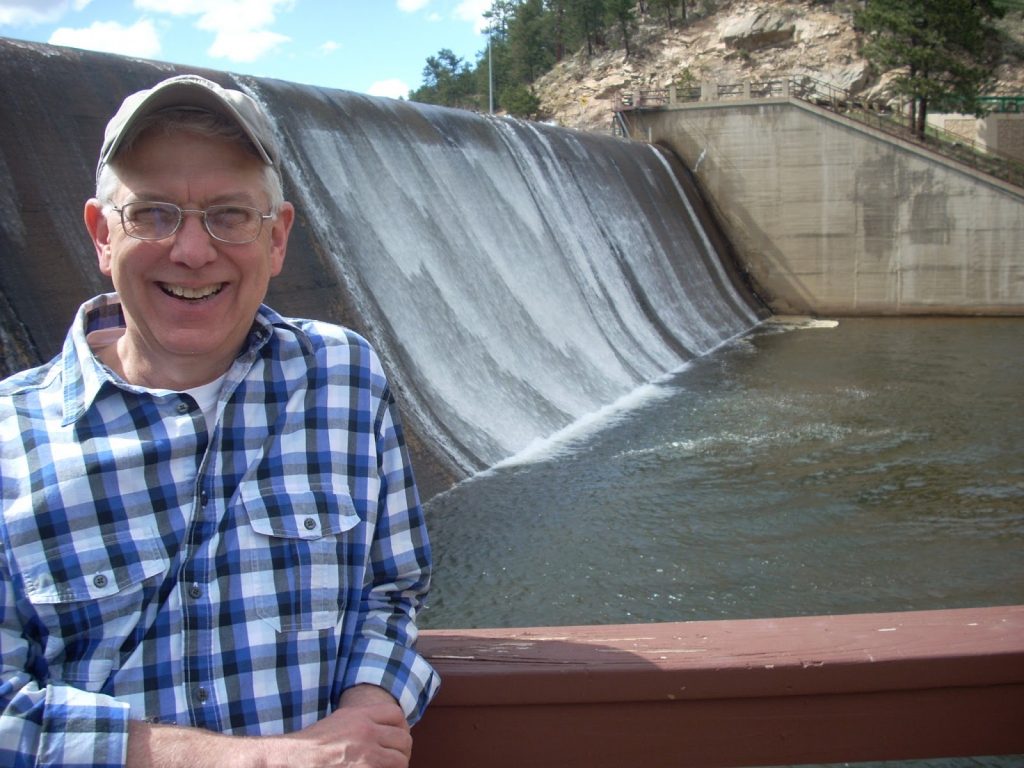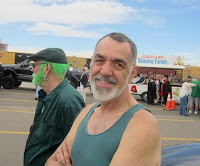Singing can be a lot of fun, whether alone, with a few friends, or maybe even in a huge choir like Norman’s Nabertackle Choir. Of course, that all depends upon whether the people sound like crows or nightingales. Psychologists, as well as simple music-lovers, have learned that music also can be a very healthful activity, sharing with friends, relieving stress, and even building new brain cells.
When I was very young, I heard a lot of classical music and folk music. My first exposure to live singing was when I was three and in nursery school. We had a visit by the legendary Woody Guthrie. He had created a series of children’s songs that he called “Songs to Grow On.” Even now, I remember some of them, such as his “Jig Jig Jig Jig Jig Along Home,” and the line, “The momma rat took off her hat, shook the house with the old tomcat; the alligator beat his tail on a drum. Jig along, jig along, jig along home.” While Woody sang and played his guitar, we all joined in on the refrain. And, there was the song about taking a bath with the line, “Oh Daddy, oh Daddy, come smell of me now. Don’t I smell nice and clean-o.” Each line substituted another person to “come smell of me now.” Not exactly a Handel oratorio, but it was great at age three.
My elementary school had a music teacher, as had many grade schools of the time. (I know that, since then, many schools have eliminated art and music as supposedly “non-essential” programs.) In my case, the teacher was Miss Morley, a rather matronly woman in her sixties whose hair-rinse turned her hair blue. I know that she was well intentioned, but her understanding of youngsters was not particularly developed.
At the beginning of each class, role-call was taken through her singing out each name, and each student would answer by singing “I’m here.” This practice continued when we also had student-teachers. Most student-teachers, as well as grade-school teachers, were women; however, we once did receive a male student-teacher. He, also, was obliged to call out the role through singing. Now, I have to explain that, for some reason unknown to me or my parents, I already had begun to develop a lower voice by fourth grade. As a consequence, I proudly responded to the man by singing “I’m here” in the same register as the man. For some peculiar reason, Miss Morley thought my response was rude. She punished me by having me sit in the corner, facing the wall. So much for masculinity.
By the time we moved to the public junior high, many of us already had begun to take interest in other students in a more personal manner. As a consequence, I noticed that the most handsome boy by far in the whole school was Walter. I tried to keep my admiring glances to a minimum, but I’m sure that they did not go unnoticed. What I did not realize was that Walter apparently had made similar glances toward me. In retrospect, I wished that we had clarified our mutual attraction more privately than Walter chose. Here we were in seventh-grade choir, sitting on metal folding chairs, when Walter suddenly threw himself across my lap. Walter lying in my lap was just fine with me but not in a class where both teacher and other students could observe and possibly embarrass us. I let Walter slide off my lap onto the floor. Afterwards, I felt like a fisherman in a contest who has caught the championship fish but deliberately let the prize escape. Ah, life’s missed opportunities!
Some of us remember a time when singing together around camp fires, either in Boy Scouts or summer camps, was a common form of entertainment. Not all of those songs were “Ninety-nine Bottles of Beer on the Wall,” either. Some were cowboy songs, Civil War songs, and British or Appalachian ballads. Undoubtedly, my interest in genuine folk music grew out of my early exposure to recordings by Burl Ives, Susan Reed, Tex Ritter, John Jacob Niles, and Richard Dyer-Bennett. I’ll always remember a live performance by the legendary Pete Seeger. As he sang and played his banjo, he would tap his left toe, then his right; and as his enthusiasm grew, he tapped both feet together.
I recall once when camping in New England with my family, a group formed spontaneously around an evening camp fire and sang songs to the accompaniment of a guitar. One of the group was a young fellow by the name of Jay Rockefeller. I heard recently that Jay will be retiring from Congress. How time has passed. I suppose that, now days, youngsters are too sophisticated and too modern to care about doing such things.
During that summer, my family stayed in Waterville, Maine. Nearby was the New England Music camp. Naturally, I joined the choir. Very early on, my ears detected a most astonishing voice, a tenor worthy of a professional choir or even an opera company. That remarkable voice belonged to young but very large fellow who came to be known by the campers as “Paul Bunyan” because of his size. His voice was strong, focused, and quite beautiful. He also surprised me; for, when the tenors’ part had a rest, he would start singing the soprano line. His soprano was so good that it did not sound like falsetto. I had to guess that Paul just had a unusually wide range.
Well, Paul’s voice did not go unnoticed among the camp staff. One evening, he was asked to stand on the shore by the lake and sing “The Lord’s Prayer.” While he was singing, we all noticed that the lighted boats on the lake all stopped. Not until Paul’s powerful notes finally ended did the boats start up and resume their travel. The last that I heard of Paul was that the music staff took Paul to the Metropolitan Opera for an interview. He was rejected, however, when everyone discovered to their surprise that Paul could not read a single note of music. All that time, he had been singing only “by ear.”
When I was sixteen, I won a modest scholarship to the prestigious Interlochen Music Camp in Michigan. Among the many activities there were various choirs. One of my greatest pleasures, next to being in the same cabin with Hank, was being in the high-school choir. I made a point of always being on time for the start of practice and never was late except for the one time that Hank sat next to me on a bunk and held me so tightly that I just could not escape…or maybe I just did not want to escape. His caresses were too inviting. Later, when I returned to the doldrums of my unloving home, I fantasized that, maybe I should have run away with Hank at the end of summer camp. I don’t know how we would have survived, but the idea still was attractive.
Being in the high school choir entitled me to also join the combined festival choir. That huge choir of teens and adults was so large and impressive that we were able to perform choral works for eight parts rather than a mere four. The sound, for me, was so wonderful that it gave me an adrenaline rush, a tingling that was almost as exciting as Hank’s caresses.
During my teens, I continued my interest in singing by collecting traditional folk ballads and occasionally singing them for myself. I entered a few contests and won some prizes; however, I never again had the pleasure of participating in a choir. In my late teens and into my early-twenties, I collected folk ballads into a notebook, but I found very few people who had an interest in such music.
Unfortunately, the only person I found who enjoyed singing with me was my friend Dee. Sometimes while we walked together, I would strike up a song, and she would join in. Until then, I always thought that the term “monotone” simply was a term, not actually a precise description of how some people sing. Dee, however, dispelled that misconception. She sang everything literally on one note. She did sing, however, with great enthusiasm, although I would have preferred a melody to go with it.
At least, Dee’s monotone was not so disturbing as the voice of a more recent acquaintance. He is totally tone-deaf; but in addition, his voice sounds like a crow with laryngitis. He informed me that a church-choir director once told him that he is “not a true monotone because his voice wavers so much,” which I thought was terribly funny.
When I went to England, I imagined that I would learn more wonderful ballads. After all, I was going to the home of the English-minstrel tradition. Of course, I was naïve, for no one I met had any interest or knowledge of such music. They all were into pop.
The closest I came to encountering folk music was on just one occasion when I first arrived in Southampton. My parents and I sat in a small restaurant for a late lunch and to make our travel plans for the day. There were no other patrons at the time. While my parents were busy in discussion, I looked about the restaurant. I noticed a bartender nearby polishing glasses. Apparently, he noticed me, too, and liked what he saw; for he softly sang a verse of a sea-chantey that I was able to hear but, fortunately, my parents did not hear. To this day, there is no way I could forget what he sang. His lines were, “Oh Robin Roy, the cabin boy, was a dirty little nipper. He stuffed his ahss with broken glahss and circumcised the skipper.” Obviously, that was not choral music, and it was just as well; for can you imagine the huge festival choir, in front of all the adoring parents, belting out, “Oh, Robin Roy…?!”
© 19 February 2013
About the Author
I have had a life-long fascination with people and their life stories. I also realize that, although my own life has not brought me particular fame or fortune, I too have had some noteworthy experiences and, at times, unusual ones. Since I joined this Story Time group, I have derived pleasure and satisfaction participating in the group. I do put some thought and effort into my stories, and I hope that you find them interesting.
